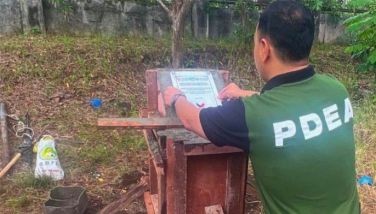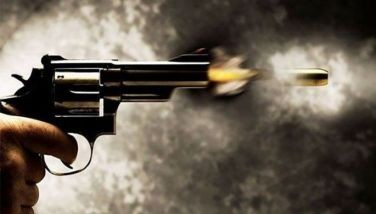How columns are lost in the e-mail
January 16, 2007 | 12:00am
While vacationing in Ireland a few weeks back, I was under the illusion that the columns I sent to the Philippines were stored for future publications. I realized only later that the damage to the Internet caused by the recent Taiwan earthquake must have been worse than what telecom firms would admit.
The problem with journalists our age is that we hardly pay much attention to saving our files in the computer. Well, it’s an expensive lesson as most of what I had written had disappeared. It’s a pity because among the columns I thought I had dispatched were my first impressions about the charming city of Dublin, an urban sprawl of about 1.1 million people.
Of course, coming from a tropical country, the weather at four aggravated by the wind, certainly put me in a freezing state. Only the warm clothes my son, Rolando Jr., prevented me from freezing. But I couldn’t help my mouth from chattering from the cold.
That was a short-lived freezing experience. As soon as I got into my son’s car, the heater sort of eased my plight all the way to their home in Waterville.
As an inveterate smoker, I immediately found myself in a miserable situation. And that, to a certain extent, reminded me of how God often tries to help me out through a crisis. Because I was reduced to smoking outdoors in winter cold, I found it a daunting venture.
Frankly, I must confess that there were still 10 packs of cigarettes left when my daughter, Marites, and I left Dublin last Friday to return to the Philippines.
Now, there is a tendency to lump Ireland into just one country. Actually, it is a sparsely populated island bounded on the north, west and south by the Atlantic Ocean. It has two parts — the southern part is the Republic of Ireland and the other one is called Northern Ireland.
Two days after arrival, my Junior drove Mate and myself to Northern Ireland. It was a risky trip as fog had virtually covered the entire route from Dublin to Belfast. Based on television warnings, visibility can sometimes be reduced to only 10 feet. Modern cars enable drivers to negotiate the entire length of the highway without much problem, though.
But I immediately noticed a puzzling spectacle. Road signs in the Republic cited distances in terms of kilometers but as soon as we hit the border, it was all in miles.
Junior explained that the English North still adhered to English measures of distances, while the South now uses the metric system. The same is true with money. The South recognizes the Euro as currency. In the North, prices are still in pounds.
We drove through the heavy fog, with the speedometer often reaching the limit of 125 miles per hour speed. It was scary but we managed to reach Belfast.
Belfast is an impressive city. It is the capital of Northern Ireland. We arrived there in the middle of preparations for a Christmas fair in the city hall area.
We enjoyed the sights and were surprised to know that even with the well-publicized antagonism between the Republicans and the Loyalists, the people were friendly.
As we took turns wielding the camera, a young girl approached us and offered to take our photos. Later, Junior told me that she was actually an Australian tourist.
But the situation drastically changed when we hit the area where the two Irish factions kept on with their word war. There we found an ambience of well-maintained hostility. Both sides of the street had graffiti proclaiming each other’s position and a host of so many other issues.
When we entered the Sin Feih (the party calling for integration into the Republic) headquarters, I inadvertently mentioned to the female employees that I had befriended a lot of Irish missionary priests in the Philippines, among them Redemptorists, Columbans and Mill fathers.
Then it struck me that I must have hit a sympathetic cord when one of them muttered "Good Filipino Catholics." It seems that I had inadvertently dubbed myself as a sympathizer in the conflict.
Later, we drove back to Dublin frustrated by our failure to wade through the fog to reach to the place known as the Titanic’s "last port of call" before it sank in the Atlantic Ocean. All the way, Junior kept hoping the sun would break through the clouds. Time and again, we caught glimpses of it. But it was foggy all throughout the trip.
That was my introduction to Ireland, a country that continues to struggle with an animosity that had taken thousands of lives over the years.
When we reached ‘Dublin, I could not dissociate myself from trying to untangle the meaning of Gazelic words from their English counterparts.
That, I thought, was the puzzling thing about Ireland, a where English is the lingua franca, yet continues to adhere to Gaelic. The funny thing is that when some Irish revert to Gaelic, one can hardly understand what they are saying.
But there was no need to quibble over culture and history.
The problem with journalists our age is that we hardly pay much attention to saving our files in the computer. Well, it’s an expensive lesson as most of what I had written had disappeared. It’s a pity because among the columns I thought I had dispatched were my first impressions about the charming city of Dublin, an urban sprawl of about 1.1 million people.
Of course, coming from a tropical country, the weather at four aggravated by the wind, certainly put me in a freezing state. Only the warm clothes my son, Rolando Jr., prevented me from freezing. But I couldn’t help my mouth from chattering from the cold.
That was a short-lived freezing experience. As soon as I got into my son’s car, the heater sort of eased my plight all the way to their home in Waterville.
As an inveterate smoker, I immediately found myself in a miserable situation. And that, to a certain extent, reminded me of how God often tries to help me out through a crisis. Because I was reduced to smoking outdoors in winter cold, I found it a daunting venture.
Frankly, I must confess that there were still 10 packs of cigarettes left when my daughter, Marites, and I left Dublin last Friday to return to the Philippines.
Now, there is a tendency to lump Ireland into just one country. Actually, it is a sparsely populated island bounded on the north, west and south by the Atlantic Ocean. It has two parts — the southern part is the Republic of Ireland and the other one is called Northern Ireland.
But I immediately noticed a puzzling spectacle. Road signs in the Republic cited distances in terms of kilometers but as soon as we hit the border, it was all in miles.
Junior explained that the English North still adhered to English measures of distances, while the South now uses the metric system. The same is true with money. The South recognizes the Euro as currency. In the North, prices are still in pounds.
We drove through the heavy fog, with the speedometer often reaching the limit of 125 miles per hour speed. It was scary but we managed to reach Belfast.
Belfast is an impressive city. It is the capital of Northern Ireland. We arrived there in the middle of preparations for a Christmas fair in the city hall area.
We enjoyed the sights and were surprised to know that even with the well-publicized antagonism between the Republicans and the Loyalists, the people were friendly.
As we took turns wielding the camera, a young girl approached us and offered to take our photos. Later, Junior told me that she was actually an Australian tourist.
But the situation drastically changed when we hit the area where the two Irish factions kept on with their word war. There we found an ambience of well-maintained hostility. Both sides of the street had graffiti proclaiming each other’s position and a host of so many other issues.
When we entered the Sin Feih (the party calling for integration into the Republic) headquarters, I inadvertently mentioned to the female employees that I had befriended a lot of Irish missionary priests in the Philippines, among them Redemptorists, Columbans and Mill fathers.
Then it struck me that I must have hit a sympathetic cord when one of them muttered "Good Filipino Catholics." It seems that I had inadvertently dubbed myself as a sympathizer in the conflict.
Later, we drove back to Dublin frustrated by our failure to wade through the fog to reach to the place known as the Titanic’s "last port of call" before it sank in the Atlantic Ocean. All the way, Junior kept hoping the sun would break through the clouds. Time and again, we caught glimpses of it. But it was foggy all throughout the trip.
That was my introduction to Ireland, a country that continues to struggle with an animosity that had taken thousands of lives over the years.
When we reached ‘Dublin, I could not dissociate myself from trying to untangle the meaning of Gazelic words from their English counterparts.
That, I thought, was the puzzling thing about Ireland, a where English is the lingua franca, yet continues to adhere to Gaelic. The funny thing is that when some Irish revert to Gaelic, one can hardly understand what they are saying.
But there was no need to quibble over culture and history.
BrandSpace Articles
<
>
- Latest
- Trending
Trending
Latest
Trending
Latest
Recommended



























